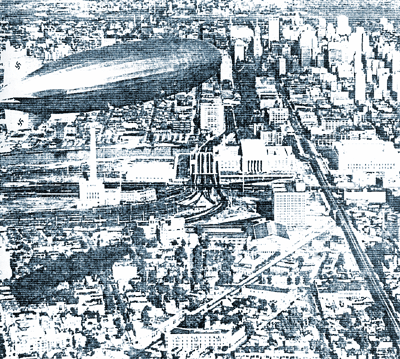An Afternoon In May

We were cleaning our pool when we heard the whirring overhead. Pool? It might be an exaggeration to use the word "pool" and it's equally excessive for me to say "we" were preparing it. The concrete wading pool in our yard was by any account the largest pool in the neighborhood. That was because it was the only one.
My dad built it for my sister and me. We could have kids from the neighborhood in as guests to splash each other and shriek as kids do, unabashedly happy with wet relief on the dog days of summertime. Our advantage was relative. The common relief on those hot days was from sprinklers and garden hoses. But water from those sources was colder than that in our pool cooked to comfortability by the sun. Our little spa had a volume of about four bathtubs but little kids not quite ready to go to school saw it in larger dimension. That's why snow was always deeper when we were little.
My dad did all the work. I stood by to give him caulk or paintbuckets and when the work was done I gave him the hose. I was allowed to turn on the tap and I watched our pool fill up with water. With the expert doing the work there would be no leaking and my father's reputation would remain intact. He was still invincible.
Jimmy Evans and Howard Glickman and Tommy Hornsby and David Terry and I were a gang in those days. They were all in the yard with me that day. My father was in the hole. He broomed out the leaves and crud. We did little chores that seemed big and important. The superintendent, my mom, barked out orders from the house. They were to us. "Don't step on the flowers" or "Get off of the fence." "Get out of that tree." "There's too much noise out there."
The pool was a fort in the off-season. We put boards over it and crouched in its security to await indians that might come by. We were under spells of heroes: Tom Mix and Buck Jones and Red Ryder and Buffalo Bill. Now for the moment it was neither fort nor pool and we stood on its empty floor while my dad cleaned up and took his brushes and cans into the cellar.
We looked up when we heard the whirring sound. Airplanes, then known to us as aeroplanes, were fascinating to watch because their flights overhead were rare. The skies were not so crowded in 1936. We might see a plane on a Tuesday afternoon and another on Friday morning and perhaps another one on the same day. They would fly low. We would imagine seeing the pilot. We would wave frantically and if the wings dipped it meant that he saw us and recognized us and acknowledged us. What a fascination; we were followers of the chronicles of Smilin' Jack and Tailspin Tommy in their two-dimensioned adventures.
Trains held the same attention. We would stand mesmerized as they rolled by and count the cars the engines pulled. At night, when the world was quiet and the clouds hung low in the sky we could hear the steam whistles on locomotives that were ever so far away.
We loved fire engines, heard and seen less than aeroplanes and choo-choo locomotives were. They had the right of way, heralded by their engines' roar, bells clanging and sirens screaming as they rushed by on their way to respond to tragedies. We were ignorant of that. Such were the observations of kids.
We didn't see a plane but saw something far better. I wonder if the passengers saw us jumping up and down from their windows?
We had never seen the likes of this and never would again. It could have passed by unnoticed if we were playing in the cellar. It glistened in the afternoon sun. It was almost a thousand feet long. Its propellers purred and it bent eastward toward its Lakehurst rendezvous. For a moment it was ours to savor and all the magic of its presence was not diminished when Howard Glickman recognized its bold insignia.
"Swastika." He knew something that was incomprehensible to us. What's a swastika? He shared his limited knowledge with his friends that day but that was passive information for small children and we were unable to absorb it, especially in the face of seeing what was an unparalleled sight.
It was the Hindenburg and it was an unmatchable wonder to the eye. It sailed to the east and away from our view and after that day it was never seen here again. The age of Zepplins ended on an afternoon in May when the great ship came to its moor and exploded. A great ball of fiery hydrogen blossomed in the evening sky and it fell to earth. Its envelope of silver turned orange in the awful descent and it charred to black in ruins on the ground.
We didn't know about that. We were little kids whose world happened where our eyesight took it. Other things would mercifully wait.
